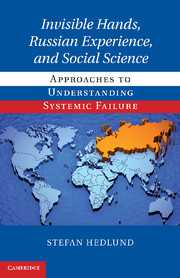 Invisible Hands, Russian Experience, and Social Science
Invisible Hands, Russian Experience, and Social Science Published online by Cambridge University Press: 01 June 2011
In the account thus far we have placed much emphasis on the combined role of opportunity and self-interest, as determinants of economic development, and we have recognized a need to go beyond the assumptions of hedonism and rationality that underpin the neoclassical economic tradition. In line with our ambition to capture the broader institutional context of transactions, we have also suggested that a distinction will have to be made between forward-looking instrumental rationality and such informal types of motivation that are somehow embedded in social structures.
It is when we investigate how the latter may influence the way in which choices are made that it becomes necessary to incorporate the role of factors we may refer to as “cultural.” As this in turn entails considering the long run and possible path dependence, the essentially ahistoric focus of transaction cost analysis must be completed with insights into the driving forces of historical progression. For such insights to be of real value, it is, moreover, essential that they be distinctly different from the common Western tradition that has produced what we presently know as democracy and rules-based market economy.
As we have repeatedly argued, the case of Russia is admirably suited to fit this ticket. It offers poignant illustrations of critical junctures, of pressures for reform that lead to actions followed by reversal, of causes that drive institutional reproduction over time, and of governance that is distinctly market-contrary.
To save this book to your Kindle, first ensure no-reply@cambridge.org is added to your Approved Personal Document E-mail List under your Personal Document Settings on the Manage Your Content and Devices page of your Amazon account. Then enter the ‘name’ part of your Kindle email address below. Find out more about saving to your Kindle.
Note you can select to save to either the @free.kindle.com or @kindle.com variations. ‘@free.kindle.com’ emails are free but can only be saved to your device when it is connected to wi-fi. ‘@kindle.com’ emails can be delivered even when you are not connected to wi-fi, but note that service fees apply.
Find out more about the Kindle Personal Document Service.
To save content items to your account, please confirm that you agree to abide by our usage policies. If this is the first time you use this feature, you will be asked to authorise Cambridge Core to connect with your account. Find out more about saving content to Dropbox.
To save content items to your account, please confirm that you agree to abide by our usage policies. If this is the first time you use this feature, you will be asked to authorise Cambridge Core to connect with your account. Find out more about saving content to Google Drive.